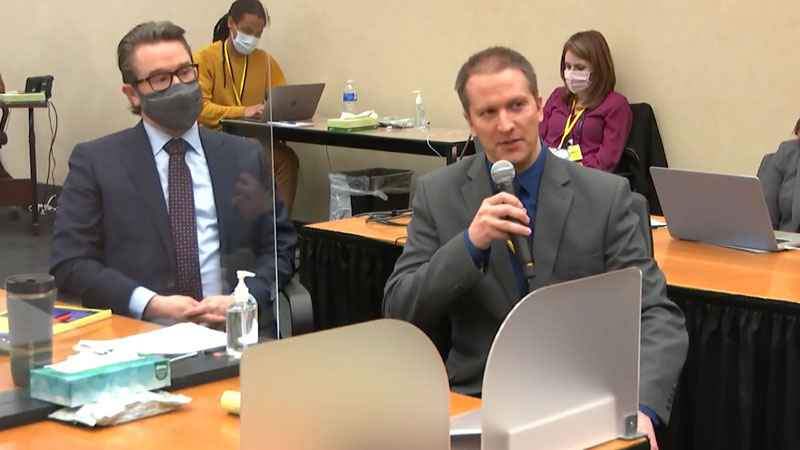Closing arguments set to begin Monday as both sides rest cases in Chauvin trial
[anvplayer video=”5022245″ station=”998122″]
Closing arguments are set to begin on Monday as the Derek Chauvin trial nears its conclusion.
Thursday morning, former Minneapolis police officer Chauvin invoked his Fifth Amendment right, preventing him from taking the witness stand to testify.
The defense side drew to a close when Chauvin, his COVID-19 mask removed in a rare courtroom moment, informed the judge that he would not testify. It would have been the first time Chauvin publicly told his side of the story.
"Is this your decision not to testify?" Hennepin County Judge Peter Cahill asked.
"It is, your honor," Chauvin replied.

In this image from video, defense attorney Eric Nelson, left, and defendant, former Minneapolis police officer Derek Chauvin address Hennepin County Judge Peter Cahill during motions before the court Thursday, April 15, 2021, in the trial of Chauvin, at the Hennepin County Courthouse in Minneapolis. [Courtroom Video]
The defense rested its case before the state prosecution team recalled a witness to the stand, Dr. Martin Tobin. The lung and critical cafe expert was called to knock down a defense witness’ theory that carbon monoxide poisoning from a squad car’s exhaust might have contributed to Floyd’s death. Tobin noted hospital tests that showed Floyd’s level was at most 2%, within the normal range.
And with that, both sides finished presenting their cases.
Derek Chauvin will not testify, defense rests case as closing arguments scheduled for Monday
"Closing arguments are the chance for each side to tell the jury what to think about those facts," Mark Osler, a former federal prosecutor said.
A former federal prosecutor and current University of St. Thomas law professor Mark Osler explains what both sides hope to accomplish during closing arguments.
"What we’re going to hear is a greatest hits package from the government: they’ll go back and say, ‘you’ll remember when Dr. Tobin said this’ and then they’ll connect it up to an element that must be proven," he said.
"For the defense, Eric Nelson is thinking through how can I stitch together the many different threads that I needed to show reasonable doubt," Osler added.
Prosecutors will present their arguments before the defense. Then, the state gets one more chance to be heard.
"There’s great power in going last and being the last voice the jury hears," Osler said.
After closing arguments, the diverse jury — consisting of six white women, three Black men, two white men, two multiracial women and one Black woman, ranging in ages from the 20s to 60s — will begin deliberations at the barbed-wire-ringed courthouse, with the city of Minneapolis on edge against a repeat of protests and violence that broke out last spring over Floyd’s death.
Cahill reminded the jurors they will be sequestered starting Monday, and said, "If I were you, I would plan for long and hope for short."
The question of whether Chauvin would testify was the subject of weeks of speculation.
The risks were high: Testifying could have opened him up to devastating cross-examination, with prosecutors replaying the video of the arrest and forcing Chauvin to explain, one frame at a time, why he kept pressing down on Floyd.
But taking the stand could have also given the jury the opportunity to see or hear any remorse or sympathy he might feel. He would have been able to remove the mask he has had to wear at the defense table.
The only time Chauvin has been publicly heard defending himself was when the jury listened to body-camera footage from the scene last May. After an ambulance had taken Floyd away, Chauvin told a bystander: "We gotta control this guy ’cause he’s a sizable guy … and it looks like he’s probably on something."
Chauvin’s attorney Eric Nelson has argued that the 19-year Minneapolis police veteran did what he was trained to do and that Floyd died because of his illegal drug use and underlying health problems.
Prosecutors say Floyd died because the white officer’s knee was pressed against Floyd’s neck or neck area for 9 1/2 minutes as he lay on the pavement on his stomach, his hands cuffed behind him and his face jammed against the ground.
The court will reconvene Monday starting at 9 a.m. KSTP will stream it live, as it has done throughout this trial.
The Associated Press contributed to this report.